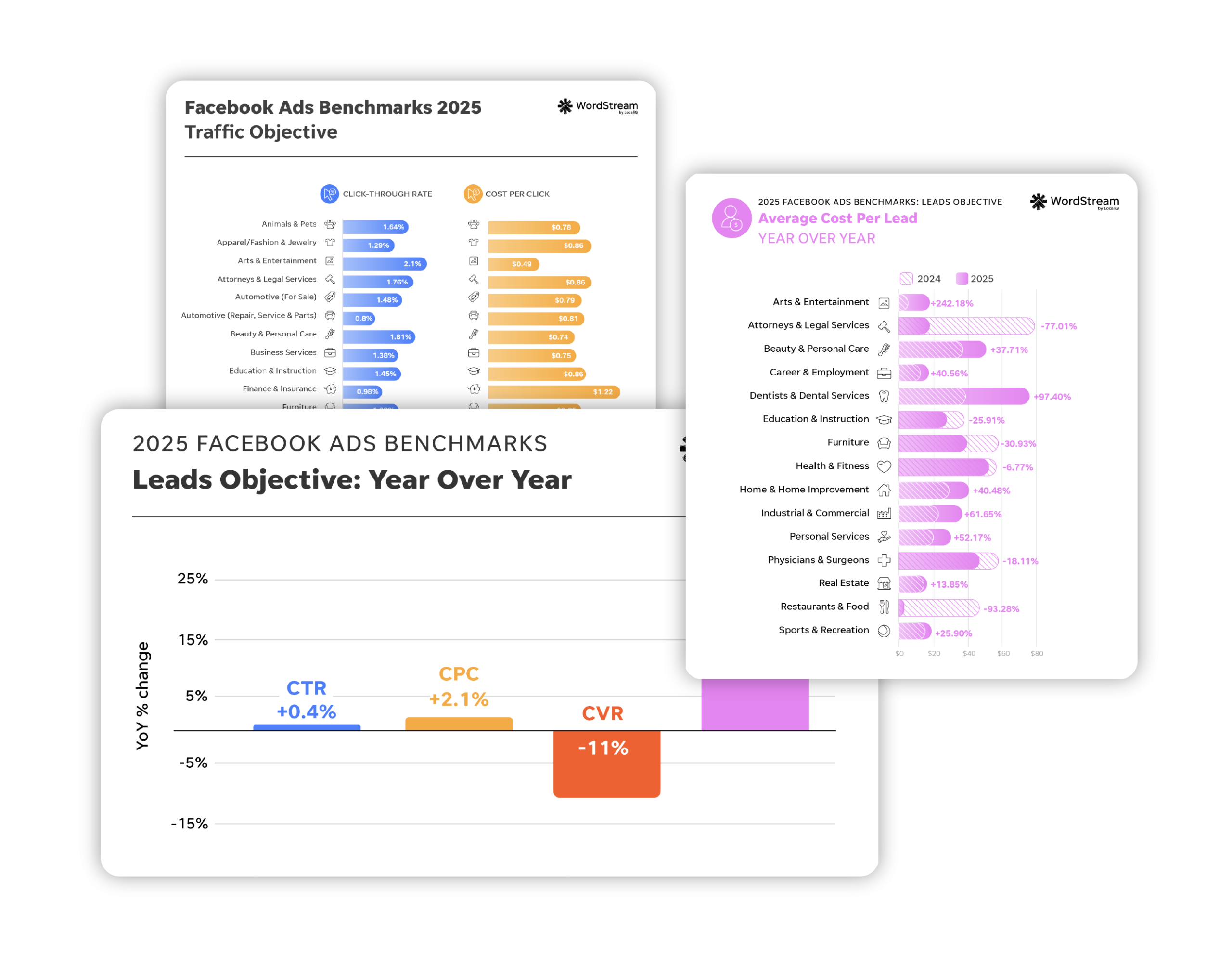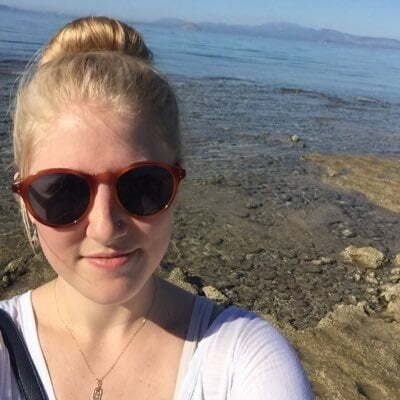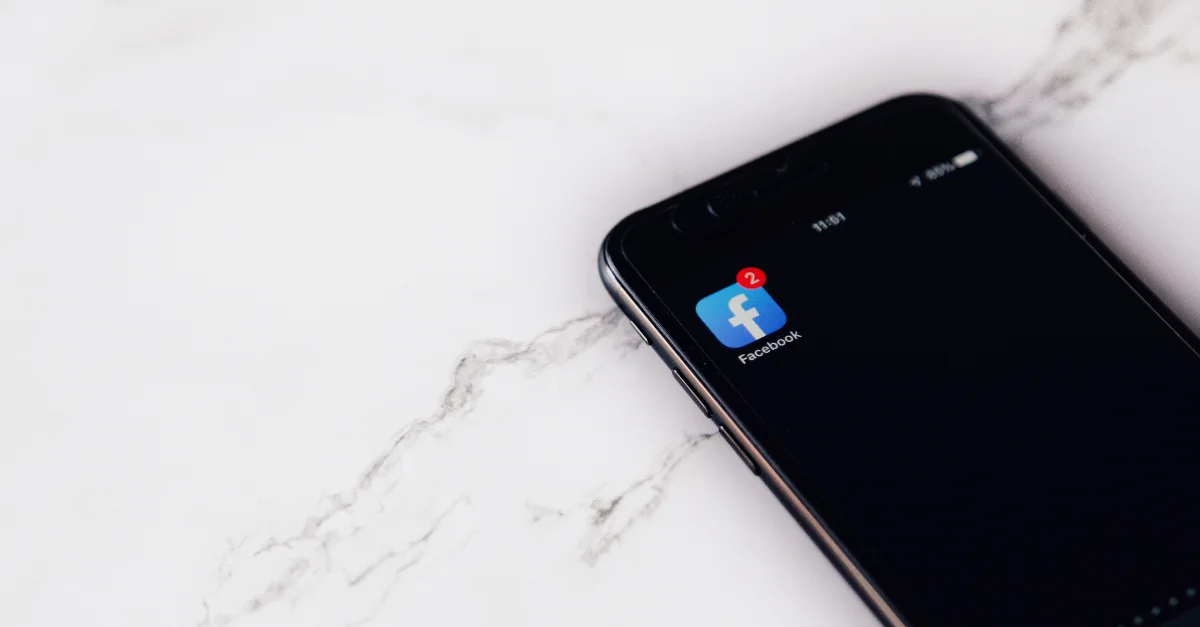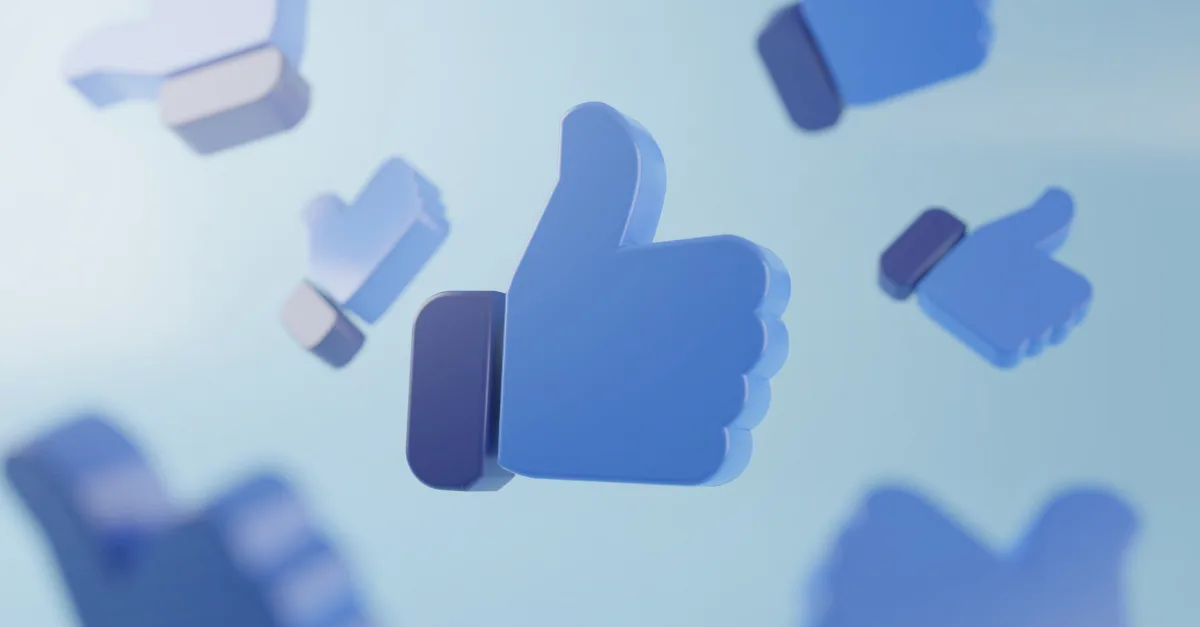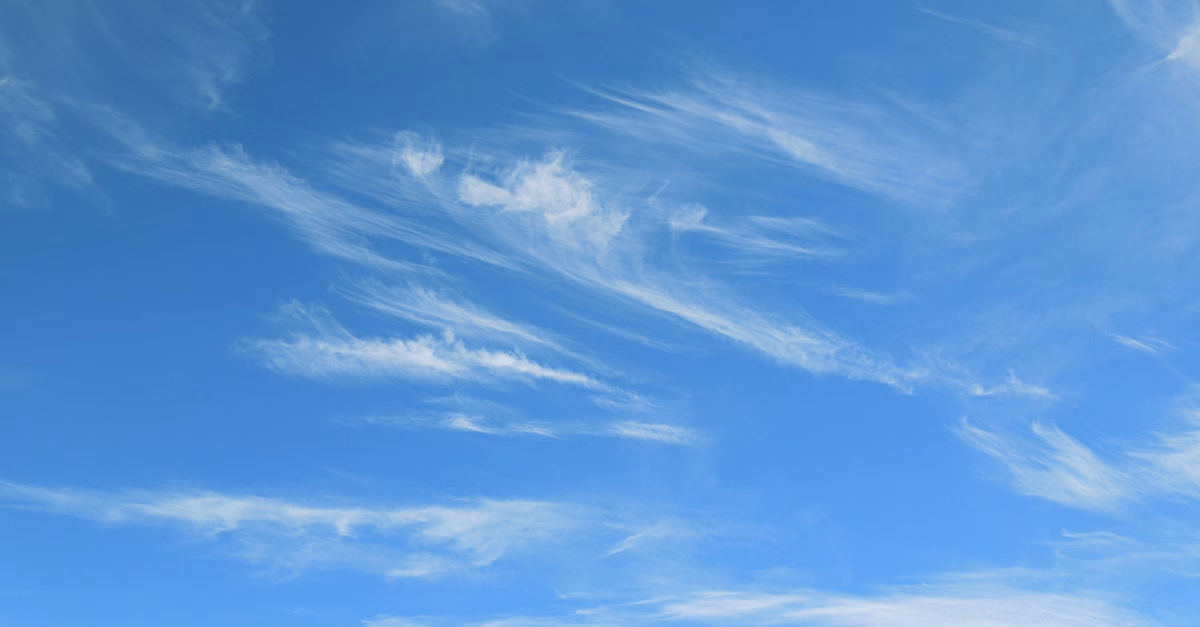We’ve heard a lot of moaning and complaining about LinkedIn advertising not working. We’ll admit it: unlike Facebook, LinkedIn is not for every business. But that doesn’t mean that it isn’t useful.
There are tons of B2B marketers out there leveraging LinkedIn advertising to spread brand awareness and drive lead generation. This is the largest stage for business-minded social interactions. If you are targeting c-suite professionals, providing educational material to marketers, or just spreading brand awareness, LinkedIn advertising is the solution for you.

First things first, if you are going to advertise on LinkedIn, your company needs to have a LinkedIn company page to publish content. Once you have that all set up, you can dive into the specifics of LinkedIn Ads. Don’t worry – I’m here to help with those.
In this comprehensive LinkedIn advertising guide, I’ll review everything you need to know to get started, including:
- LinkedIn ad types and formats
- Remarketing with LinkedIn advertising
- LinkedIn advertising targeting options
- Linkedin advertising best practices
- Linkedin advertising examples
LinkedIn ad types
Like other social advertising platforms, LinkedIn advertising offers you a variety of ad types and formats to play with. And, like other platforms, you should be selecting your ad format based on the overall action you want to drive. Across all their offerings, LinkedIn advertising supports brand awareness, website visits, engagement, video views, lead generation, site conversions, and job applications.
LinkedIn sponsored content
Sponsored content ads look and feel native to the LinkedIn platform. These are the ads that appear to be “boosted” posts from a company’s own feed. Your ads manager can create a typical post with a headline, image and link to sponsor. Or you can create carousel ads, video ads, and lead generation ads that appear in the same “boosted” format.
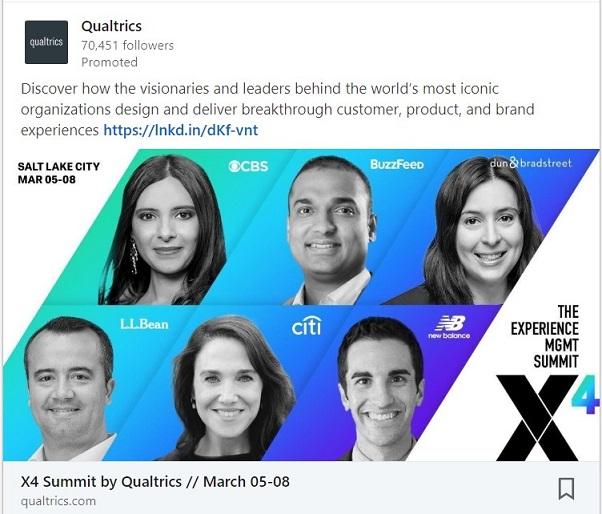
LinkedIn text ads
LinkedIn text ads are the closest to Google or Bing search ads that you can get on the platform. LinkedIn text ads operate on a familiar pay-per-click or impression basis, and they’re featured in the sidebar. These are admittedly kind of boring for a social platform – a basic text block with a headline, next to a company logo.
LinkedIn Sponsored InMail
Know that feeling when you log into LinkedIn and have 10 new messages? It’s likely that some of those are marketers popping into your inbox through Sponsored InMail for a pretty penny. Marketers or sales teams can curate a list of contacts to send personalized messages to. The content of the messages is largely up to you – you want to invite prospects to events or even attempt to generate an inbound call.
LinkedIn programmatic display ads
LinkedIn joined the fray of programmatic offerings, which is great news for B2B advertisers who rarely have good options for targeting. With these display ads, you can target the largest professional audience based on intent or personas – but more on LinkedIn advertising targeting options later. In terms of ad creative, it’s your run-of-the-mill display ads. Marketers can choose their preferred demand-side platform or trading desk and buy inventory through open or private auctions.
LinkedIn dynamic ads
Dynamic ads are basically as personalized as you can get with your LinkedIn advertising. Advertisers can choose to promote job postings, content downloads, their own company page, or drive traffic to a website via spotlight ads, which also appear on the newsfeed. This ad type also has set templates and auto-translation options to make personalizing the ad creative easy for you.
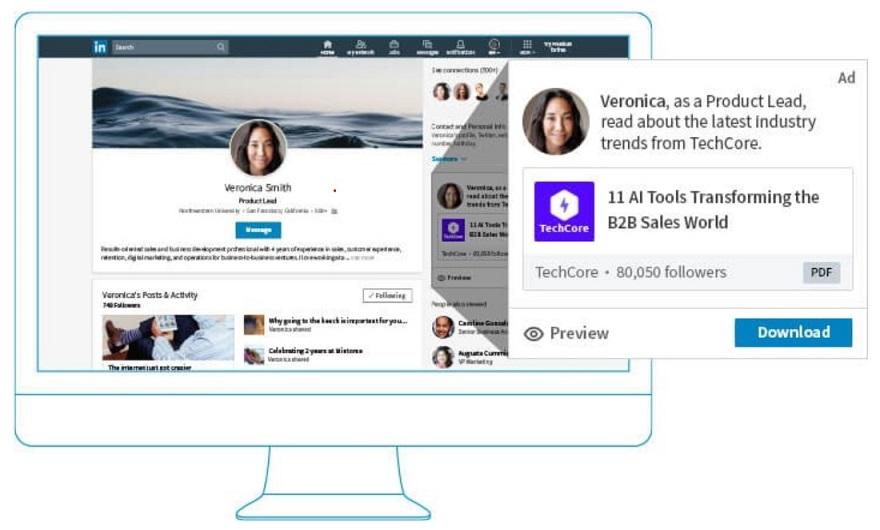
Bonus: Elevate
Plot twist: Elevate is not an ad, per se, but it works as a LinkedIn advertising solution. Elevate is a platform that a company can pay for their employees to become brand advocates. Basically, it makes it easier for your marketing or sales team to control or suggest content that your employees share on LinkedIn. Should employees be sharing your suggested content anyway? Probably. But this spoon-feeds posts and moves the needle – my company saw three hires learn about us from Elevate posts and had $20k+ in earned media!
LinkedIn advertising costs
As on other platforms, LinkedIn advertising costs are determined by your bids and budgets. This means that your overall ad spend will vary depending on your business and your goals, because this determines the types of ads that you choose for your campaigns and the budgets that you set.
However, LinkedIn advertising does come a few minimums that all advertisers must spend:
- $10 daily budget per campaign
- $10 total budget per campaign (an optional feature for Sponsored Content)
- $2 bid for CPC or CPM on Text Ad campaigns
LinkedIn advertising also has a minimum bid for Sponsored Content campaigns, but the exact for this ad will depend on the audience that you’re targeting. Which brings us to…
LinkedIn advertising targeting options
This is where LinkedIn advertising gets exciting. The targeting on this social platform is better than most. It’s regularly updated and thorough, because professionals like to brag about all of their promotions and achievements. Members contribute their own job titles, company names, seniority, professional interests, and more. With over 500 million members consisting of 73 million senior-level influencers and 45 million decision makers, it’s extremely likely your LinkedIn ads are going to land in front of the right eyeballs.
Matched audiences
To get started, you should place a tag on your website to be able to retarget your visitors on LinkedIn, just as you would set up for Facebook or Google. LinkedIn calls their tag an “Insight Tag,” and it can also be used to create lookalike audiences. In addition to targeting your website visitors, you can also upload or integrate email lists and run account-based targeting through LinkedIn.
Don’t have enough website visitors or sales prospects to build out a viable campaign audience? No problem! LinkedIn advertising features an audience option that expands your reach through their network of publishers. This is generally brand-safe, but beware – it can make your audience large.
Aside from the basic Insight Tag, you can also place conversion tracking on your LinkedIn advertising campaigns. These triggers are great to track unique purchases or other actions on your site, especially if you do not use a marketing automation system to create unique landing pages and forms.
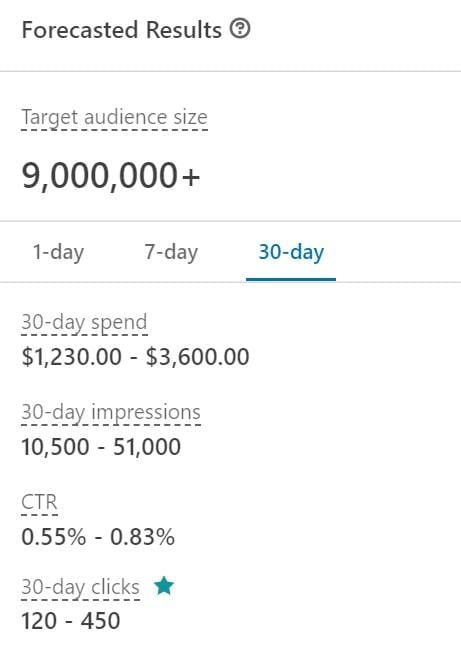
Audience options
LinkedIn ads come with exhaustive options for targeting, which means that you’re able to make sure your ads are getting served to the right people. If you are interested in testing the effectiveness of an ad against different audiences, you can save your audience as a template to layer on later.
To set up your LinkedIn advertising targeting, start with the basics first: language and location. You can choose a permanent geolocation as specified in user profiles, i.e., “The Greater New York Area,” or shorter-term location based on IP address.
Once you’ve determined the language and location, you can narrow down your audience based on these targeting options available.
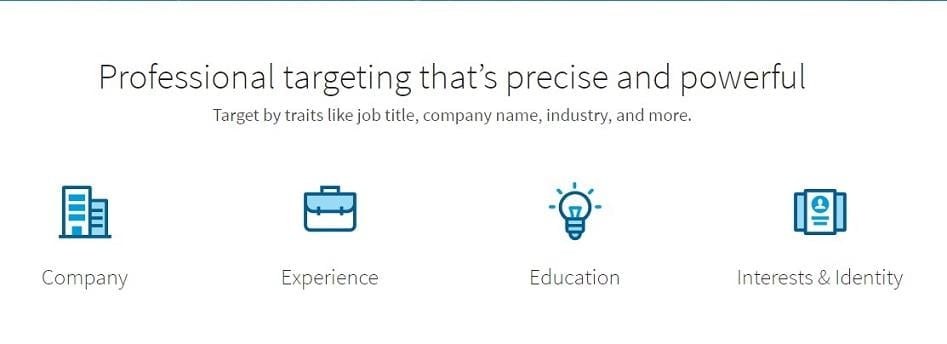
Company
Targeting by company is especially useful if your sales team has defined verticals. An added bonus, LinkedIn advertising offers the best targeting by company option compared to other platforms (ahem, Facebook or Twitter), because members are far more likely to keep their employment info up-to-date.
If targeting a specific company isn’t right for your strategy, you can still use this targeting option to narrow down your audience.
Company connections: LinkedIn allows you to target first-degree connections of selected companies – if they have over 500 employees.
Company followers: This selection will let you reach your company page followers.
Industries: Based on the primary industry listed on company pages, you can reach LinkedIn members employed in those industries.
Names: Reach employees based on the company name listed on their profiles.
Size: Based on the number of employees listed on a company profile, you can reach employees who work at companies of a certain size.
Demographic
This is much simpler: Add members to your audience that are of a certain age or gender, which is inferred from their profile.
Education
LinkedIn Ads lets you reach members based on their degrees, fields of study (e.g., “Marketing,” or “Journalism”), and the institution they attended.
Job experience
Like targeting by company, building an audience based on jobs is done best on LinkedIn.
Functions or skills: You can build an audience composed of tasks in their job positions or skills listed in their profiles. The skills can also be gleaned from endorsements from connections.
Seniorities, titles, or experience: Reach LinkedIn members with a certain level of seniority, a job title, or years of experience listed on their page. Heads up: If there are gaps or overlaps on someone’s jobs, those are not counted!
Interests
LinkedIn introduced interest-based targeting just recently. Now, you can include users who have joined groups around certain interests – like brand marketing or digital advertising – and people with interests that align with your business.
If you target certain job titles, companies of a specific size, and followers of your company page, remember that LinkedIn creates the audience based on an “AND” statement, which can easily shrink your audience to an unrealistic size. Don’t worry! You can also elect to exclude certain criteria as well.
I recommend choosing one grouping to focus on: Create an audience that targets by job function and a different one targeting by groups. Then you can easily measure how your ads resonate and adjust bidding accordingly. LinkedIn Ads do not have you compete against yourself, so if there is overlap – a member who exists in more than one of your audiences – you won’t pay double to reach them.
Depending how big your audience is and the type of ads you run, LinkedIn generally recommends a certain level of saturation in your advertising strategy. The higher the impression rate, the more likely a prospect is to click on your ad. Is that expensive? Definitely. Effective? Find out for yourself!
Quick update: You can now segment your LinkedIn Ad traffic according to job function, company, company size, and more. Learn more about using the LinkedIn Website Demographics feature to improve your ad performance and create effective audiences.
3 LinkedIn advertising best practices
As important as it is to know the technical aspects of LinkedIn advertising, all the information I’ve shared with you today is pretty much useless if you don’t know how to leverage it to build successful campaigns. That, dear readers, is why I want to wrap up with some time-tested LinkedIn advertising best practices. Here’s three to take with you as you get started!
1. Think carefully about the customer journey
Let’s return to those ad types we talked about earlier. When you’re just getting started with LinkedIn advertising, it may be tempting to try all the different products the platform has to offer. Here’s why that’s a mistake: Different LinkedIn ad types are appropriate for different stages of the customer journey.
Take Sponsored InMail, for example—the ad type that allows you to contact your LinkedIn prospects directly through their personal inboxes. I feel strongly about this, so I’ll be frank: Using Sponsored InMail as the first touchpoint between you and your LinkedIn prospects is a bad idea. Why? Because people, generally speaking, don’t enjoy getting message notifications from strangers who work at companies they’ve never heard of. As a marketing tactic, that’s about as invasive, pushy, and counterproductive as it gets.

I’m not saying you should drop Sponsored InMail from your LinkedIn advertising strategy overall. What I am saying is that you should use Sponsored InMail sparingly as a way to re-engage prospects who’ve already interacted with your business in meaningful ways. A mid-funnel prospect will be far more open to sales messages than a high-funnel prospect.
2. Layer your targeting options (but not too much)
As we saw earlier, there’s no shortage of LinkedIn advertising targeting options. As a digital marketer, you should be thrilled about this—more targeting options means more valuable opportunities! Allow me to explain.
No matter which digital advertising platform you’re looking at, the whole point of targeting options is to enable advertisers to reach the people most likely to become their customers. LinkedIn, of course, is no exception. The closer you can get to reaching your ideal customer, the less money you’ll waste on impressions and clicks from users who present no value to your business. Layering multiple LinkedIn targeting options is the only way to do this.
Let’s say you’re using LinkedIn advertising to promote a software solution that helps small restaurants optimize their online presence. If targeting users who work in the food service industry is the only parameter you set, you’re going to waste a ton of money. Alternatively, if you layer a variety of parameters in order to target owners of small restaurants, you’d drive substantially better results!
A word of warning: Don’t layer your LinkedIn advertising targeting options too much. If you go too far, you’ll target an extremely narrow audience and miss some valuable opportunities.
3. Glean insights from other advertising platforms
My apologies to anyone advertising exclusively on LinkedIn—this final best practice is for those of you who are also leveraging platforms like Google Ads, Bing Ads, and Facebook Ads.
Although every digital advertising platform is unique—people use Google actively and Facebook passively, for example—it’s generally a good idea to give your prospects a fairly cohesive experience across all the places they’re interacting with your business. From a tactical standpoint, that means repurposing the ad copy and targeting parameters that work really well on other platforms.
Take a look at the handful of Google ads that drive your best click-through rates and conversion rates. From a copy perspective, are there any themes that carry across these ads? Any particular words, phrases, or tones that seem to resonate really well with your prospects? If so, try implementing those copy elements into your LinkedIn ads.
Now, take a look at the handful of Facebook ads that drive your best click-through rates and conversion rates. Feel free to derive inspiration from this copy as well, but what I’m really interested in are the targeting parameters. Are there any custom audiences that respond especially well to your marketing messages? Does it seem like past website visitors are particularly open to remarketing? Once again, you may find that these insights are applicable to your LinkedIn advertising campaigns as well.
5 LinkedIn advertising examples to inspire you
As helpful as it is to go into your first LinkedIn advertising campaign with a handful of best practices, it’s equally important that you get a strong sense of what LinkedIn ads actually look like in action. So, we’ve assembled a quick list of five LinkedIn advertising examples that you can use for inspiration.
1. SurveyMonkey
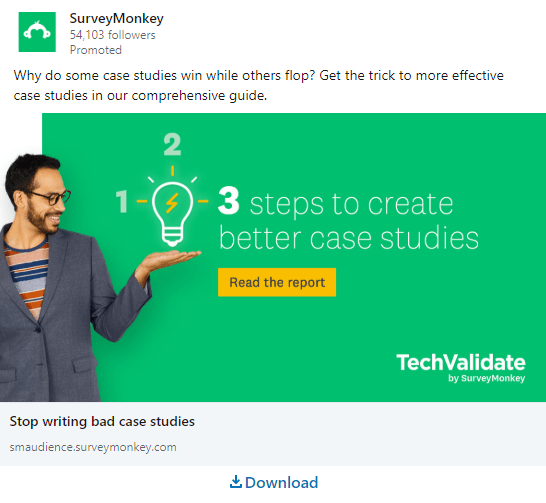
This one from SurveyMonkey is terrific simply because of how well it’s targeted towards me. As a content marketer, I’m often tasked with writing case studies—a type of content that happens to be one of the most difficult to execute effectively.
On top of meeting a pain point shared by many marketers, this ad also does a great job of enticing users to click. The featured image—in addition to being exceptionally designed—is awesome because it draws users in with the implication that the guide being promoted is accessible to everyone: “Don’t worry—the road to writing better case studies takes just three simple steps. You’ve got this.”
2. Instapage
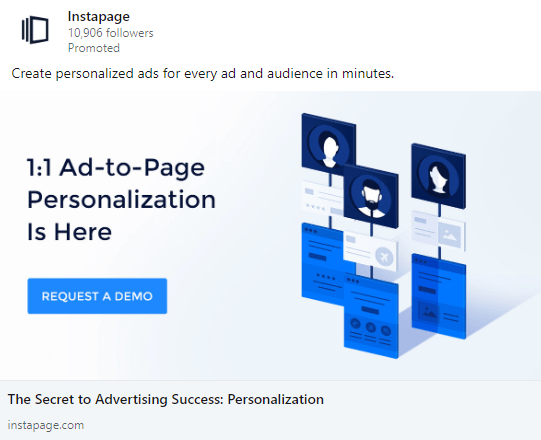
The simplicity and directness of Instapage’s value proposition is what I love about this LinkedIn ad. With a single sentence, Instapage successfully addresses two major pain points: (1) the difficulty of creating personalized advertising experiences and (2) the amount of time it takes to build an effective landing page. That’s great copywriting!
I also appreciate the thoughtful use of contrast in this LinkedIn ad; the blue of the “Request A Demo” CTA button stands out nicely against the silvery background. If you don’t clearly direct your prospects’ attention to a CTA, you may as well not invest in LinkedIn advertising.
3. Airtable
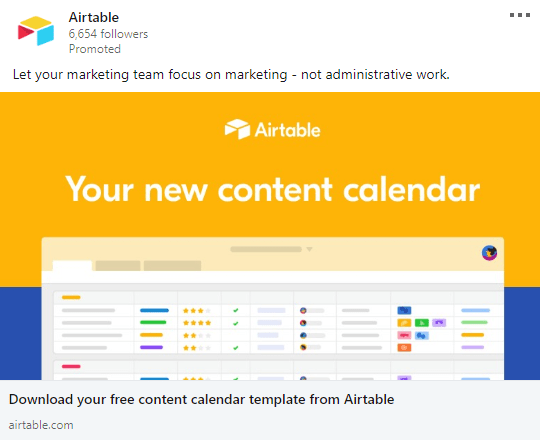
Like Instapage, Airtable nails it with their value proposition—it’s succinct, memorable, and thoughtful. Even if a particular user doesn’t click on this LinkedIn ad, you better believe they’ll remember the value Airtable offers to their customers.
Another really strong component of this ad is the alignment between the offer it’s making and the depth of the relationship between Airtable and its target audience. This is undoubtedly a top-of-funnel Linked ad—used to drive awareness, not sales. Recognizing that the users who are seeing this ad are relatively unfamiliar with their company, the marketers over at Airtable decided to put forth a low-stakes offer—a free content calendar template—that still manages to demonstrate the value of the company.
4. Verifyed
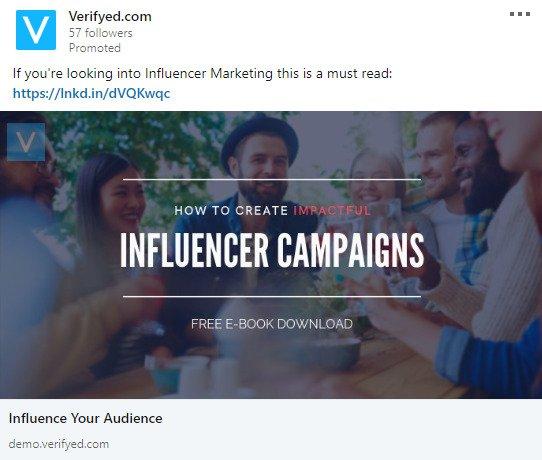
Once again we have an example of a LinkedIn ad that could not be better targeted towards me. Because a big part of my job is writing about trends in digital marketing, this piece of content from Verifyed regarding influencer marketing is virtually irresistible.
But that’s not what puts it over the edge and makes it a great LinkedIn ad; what makes it a great LinkedIn ad is the fact that it doesn’t feel like an ad. When I first came across this offer in my LinkedIn feed, I could have sworn it was an organic post. Because people tend to be more trusting of organic posts than advertisements, emulating this example from Verifyed would be a smart move on your part.
5. Music and Arts

Somehow, the marketing team over at Music and Arts found out that I’m a music fanatic. I don’t know how they did it, but what I do know is that they most certainly got my attention. Talk about a thumb-stopping LinkedIn ad!
What I love most about this example is the fact that it takes advantage of the carousel format—a type of LinkedIn ad that enables you to share a series of clickable cards. As you can see, this ad gave me the option of scrolling through several different links and selecting the one that resonated most deeply. No matter which vertical you operate in, we recommend breaking away from the typical single-image mold and giving the carousel format a try!
Go for a test drive with LinkedIn advertising
When LinkedIn first began dabbling in advertising, managed accounts meant that you would work with customer service reps and commit to a fixed amount of money. Luckily, LinkedIn advertising has moved changed significantly over the past few years and now offers a self-service platform that recently got a UX upgrade.
If you’re worried about spending too much money, the platform makes it easy to set budgets, bid types, and end dates. Stay on top of it, of course (we have some solid LinkedIn advertising tips here). But it is always worth a try to find the best customers for your business.

